
MMLU-Pro
The code and data for "MMLU-Pro: A More Robust and Challenging Multi-Task Language Understanding Benchmark" [NeurIPS 2024]
Stars: 339
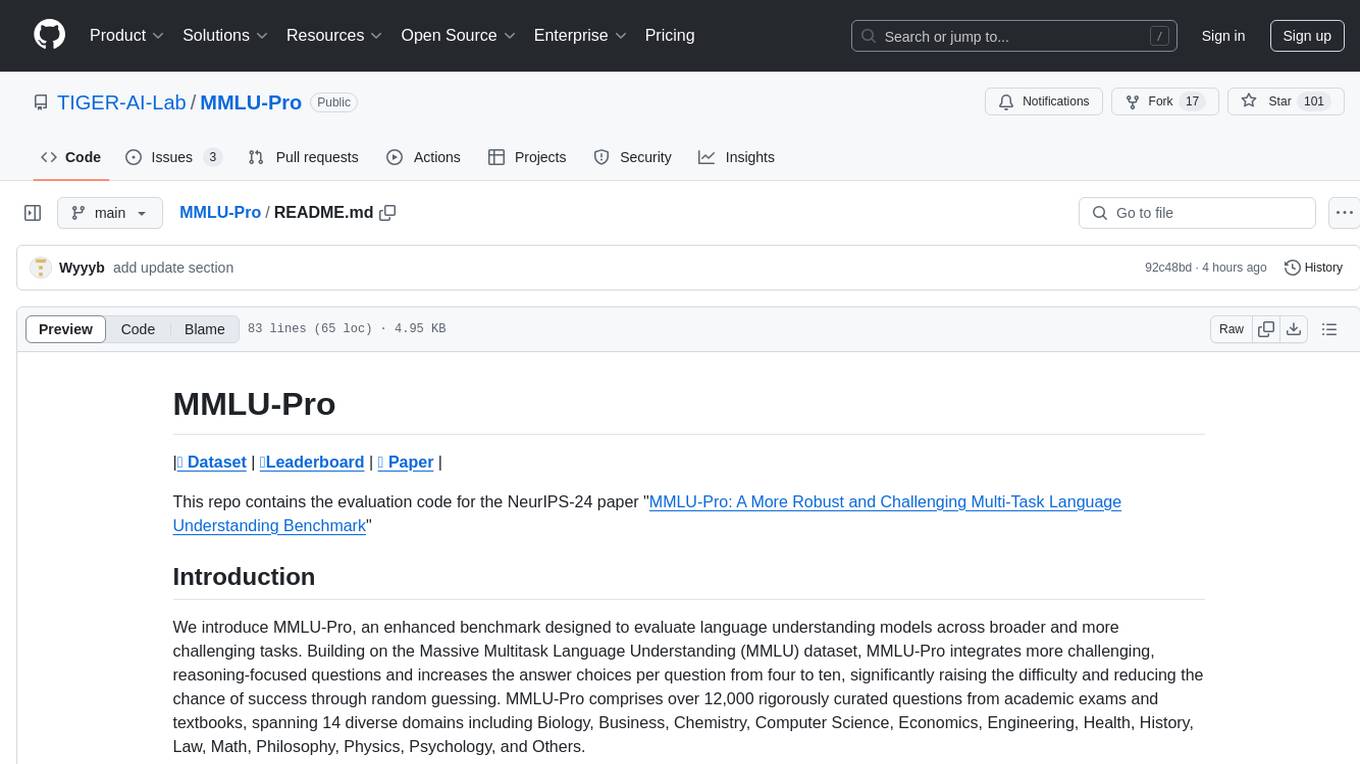
MMLU-Pro is an enhanced benchmark designed to evaluate language understanding models across broader and more challenging tasks. It integrates more challenging, reasoning-focused questions and increases answer choices per question, significantly raising difficulty. The dataset comprises over 12,000 questions from academic exams and textbooks across 14 diverse domains. Experimental results show a significant drop in accuracy compared to the original MMLU, with greater stability under varying prompts. Models utilizing Chain of Thought reasoning achieved better performance on MMLU-Pro.
README:
|🤗 Dataset | 🏆Leaderboard | 📖 Paper |
This repo contains the evaluation code for the NeurIPS-24 paper "MMLU-Pro: A More Robust and Challenging Multi-Task Language Understanding Benchmark"
We introduce MMLU-Pro, an enhanced benchmark designed to evaluate language understanding models across broader and more challenging tasks. Building on the Massive Multitask Language Understanding (MMLU) dataset, MMLU-Pro integrates more challenging, reasoning-focused questions and increases the answer choices per question from four to ten, significantly raising the difficulty and reducing the chance of success through random guessing. MMLU-Pro comprises over 12,000 rigorously curated questions from academic exams and textbooks, spanning 14 diverse domains including Biology, Business, Chemistry, Computer Science, Economics, Engineering, Health, History, Law, Math, Philosophy, Physics, Psychology, and Others.
Our experimental results show that MMLU-Pro not only raises the challenge, causing a significant drop in accuracy by 16% to 33% compared to MMLU but also demonstrates greater stability under varying prompts. With 24 different prompt styles tested, the sensitivity of model scores to prompt variations decreased from 4-5% in MMLU to just 2% in MMLU-Pro. Additionally, we found that models utilizing Chain of Thought (CoT) reasoning achieved better performance on MMLU-Pro compared to direct answering, which starkly contrasts the findings on the original MMLU, indicating that MMLU-Pro includes more complex reasoning questions.
October 10, 2024: Added the 24 tested prompt styles from the paper to the repository.
MMLU-Pro was created to provide language models with a more challenging and robust benchmark, pushing the boundaries of what these models can achieve in terms of expert-level knowledge and reasoning. Please refer to our huggingface 🤗 Dataset for more details.
To run local inference, modify the model name in the following script and execute it:
cd scripts/examples/
sh eval_llama_2_7b.shTo use the API for inference, modify the API KEY in evaluate_from_api.py script and execute the bash script:
cd scripts/examples/
sh eval_gpt_4.shTo use universal (OpenAI chat.completions) API for inference in multithread mode, modify the API KEY in evaluate_from_apiX.py script and execute:
python evaluate_from_apiX.py --url "http://127.0.0.1:8001/v1" -m "MiniMax-M2" -n 48 -o "eval_results/" execute:where --url - API url (possibly local) --model_name - model to pick from api url --num_workers - number of workers to run at the same time --output_dir - directory to put answers to
To check wrong answers - browse results (potentially changing directory with answers str = "eval_results/")
python evalshowpro.py| Model | Overall Accuracy |
|---|---|
| Claude-3.5-Sonnet | 76.12 |
| GPT-4o | 72.55 |
| Gemini-1.5-Pro | 69.03 |
| Claude-3-Opus | 68.45 |
| GPT-4-Turbo | 63.71 |
| Gemini-1.5-Flash | 59.12 |
| Yi-large | 57.53 |
| Claude-3-Sonnet | 56.80 |
| Llama-3-70B-Instruct | 56.20 |
| Phi3-medium-4k | 55.70 |
| Deepseek-V2-Chat | 54.81 |
| Phi-3-medium-4k-instruct | 53.48 |
| Llama-3-70B | 52.78 |
| Qwen1.5-72B-Chat | 52.64 |
| Yi-1.5-34B-Chat | 52.29 |
| Phi3-medium-128k | 51.91 |
| MAmmoTH2-8x7B-Plus | 50.40 |
For more details on various models and their accuracy across different subjects, please visit our Leaderboard.
We provide different alternatives to do answer extraction. We found that different answer extraction mechanisms have minor impact on the results.
python compute_accuracy.py results/llama-3-8b-quantized/CoT/all/
Thanks to @chibop1 for evaluating the robustness of MMLU-Pro across all the different answer extraction strategies and temperature. A detailed discussion is posted at Reddit.
- Yubo Wang: [email protected]
- Xueguang Ma: [email protected]
- Wenhu Chen: [email protected]
BibTeX:
@article{wang2024mmlu,
title={Mmlu-pro: A more robust and challenging multi-task language understanding benchmark},
author={Wang, Yubo and Ma, Xueguang and Zhang, Ge and Ni, Yuansheng and Chandra, Abhranil and Guo, Shiguang and Ren, Weiming and Arulraj, Aaran and He, Xuan and Jiang, Ziyan and others},
journal={arXiv preprint arXiv:2406.01574},
year={2024}
}For Tasks:
Click tags to check more tools for each tasksFor Jobs:
Alternative AI tools for MMLU-Pro
Similar Open Source Tools

MMLU-Pro
MMLU-Pro is an enhanced benchmark designed to evaluate language understanding models across broader and more challenging tasks. It integrates more challenging, reasoning-focused questions and increases answer choices per question, significantly raising difficulty. The dataset comprises over 12,000 questions from academic exams and textbooks across 14 diverse domains. Experimental results show a significant drop in accuracy compared to the original MMLU, with greater stability under varying prompts. Models utilizing Chain of Thought reasoning achieved better performance on MMLU-Pro.
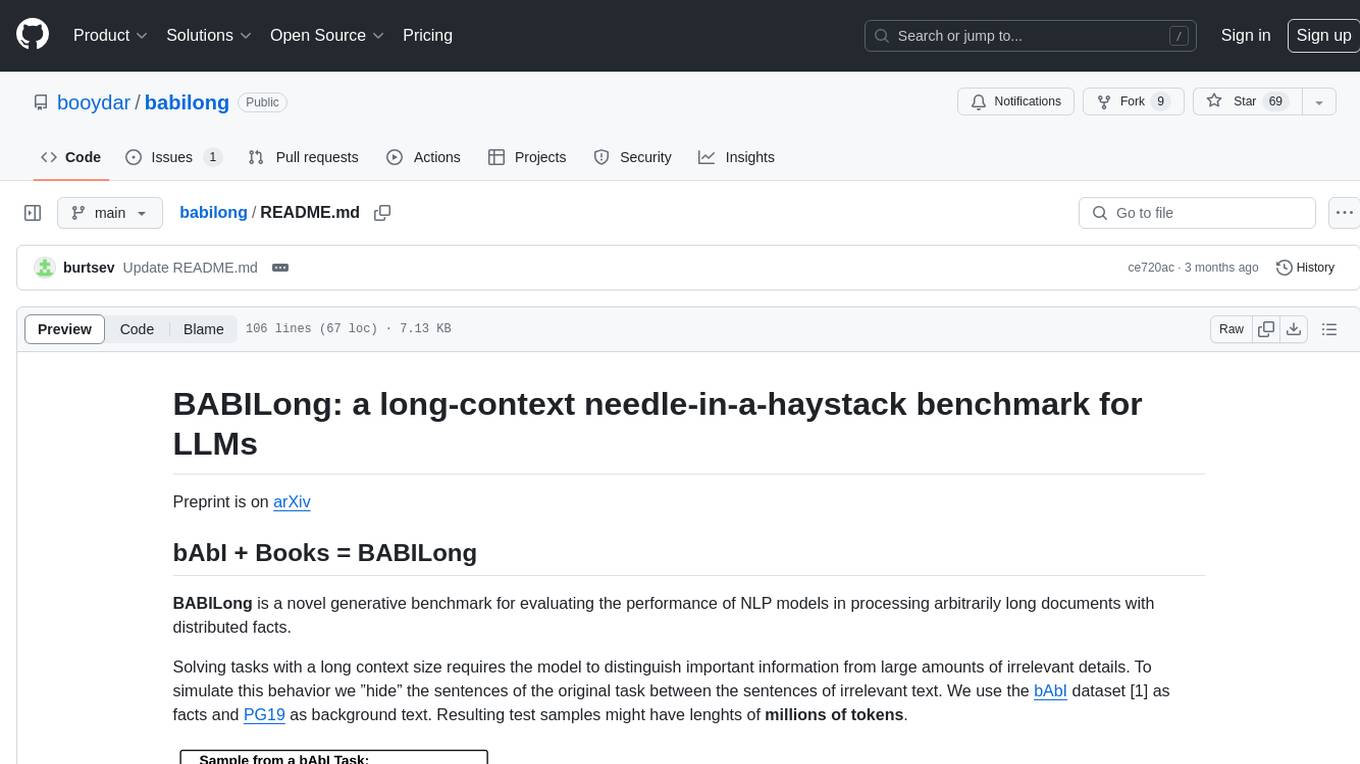
babilong
BABILong is a generative benchmark designed to evaluate the performance of NLP models in processing long documents with distributed facts. It consists of 20 tasks that simulate interactions between characters and objects in various locations, requiring models to distinguish important information from irrelevant details. The tasks vary in complexity and reasoning aspects, with test samples potentially containing millions of tokens. The benchmark aims to challenge and assess the capabilities of Large Language Models (LLMs) in handling complex, long-context information.
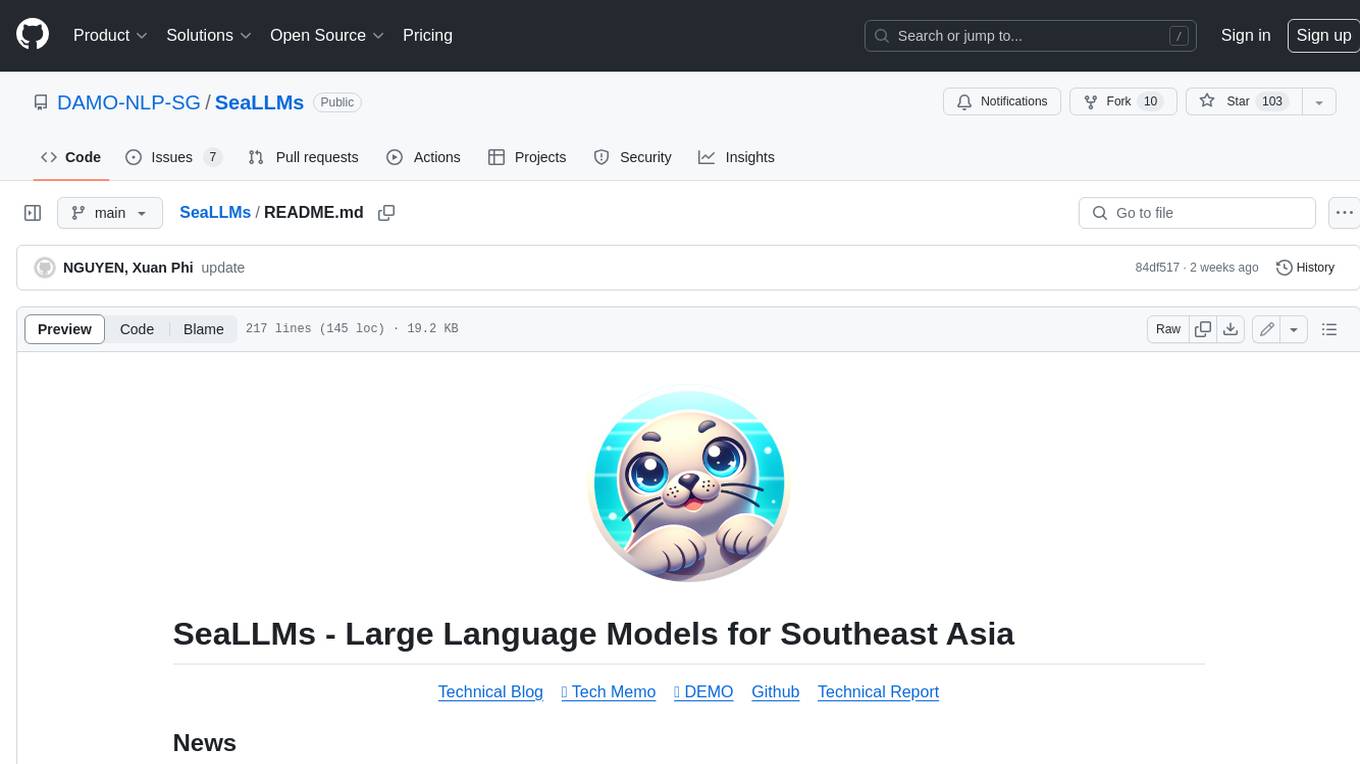
SeaLLMs
SeaLLMs are a family of language models optimized for Southeast Asian (SEA) languages. They were pre-trained from Llama-2, on a tailored publicly-available dataset, which comprises texts in Vietnamese 🇻🇳, Indonesian 🇮🇩, Thai 🇹🇭, Malay 🇲🇾, Khmer🇰🇭, Lao🇱🇦, Tagalog🇵🇭 and Burmese🇲🇲. The SeaLLM-chat underwent supervised finetuning (SFT) and specialized self-preferencing DPO using a mix of public instruction data and a small number of queries used by SEA language native speakers in natural settings, which **adapt to the local cultural norms, customs, styles and laws in these areas**. SeaLLM-13b models exhibit superior performance across a wide spectrum of linguistic tasks and assistant-style instruction-following capabilities relative to comparable open-source models. Moreover, they outperform **ChatGPT-3.5** in non-Latin languages, such as Thai, Khmer, Lao, and Burmese.
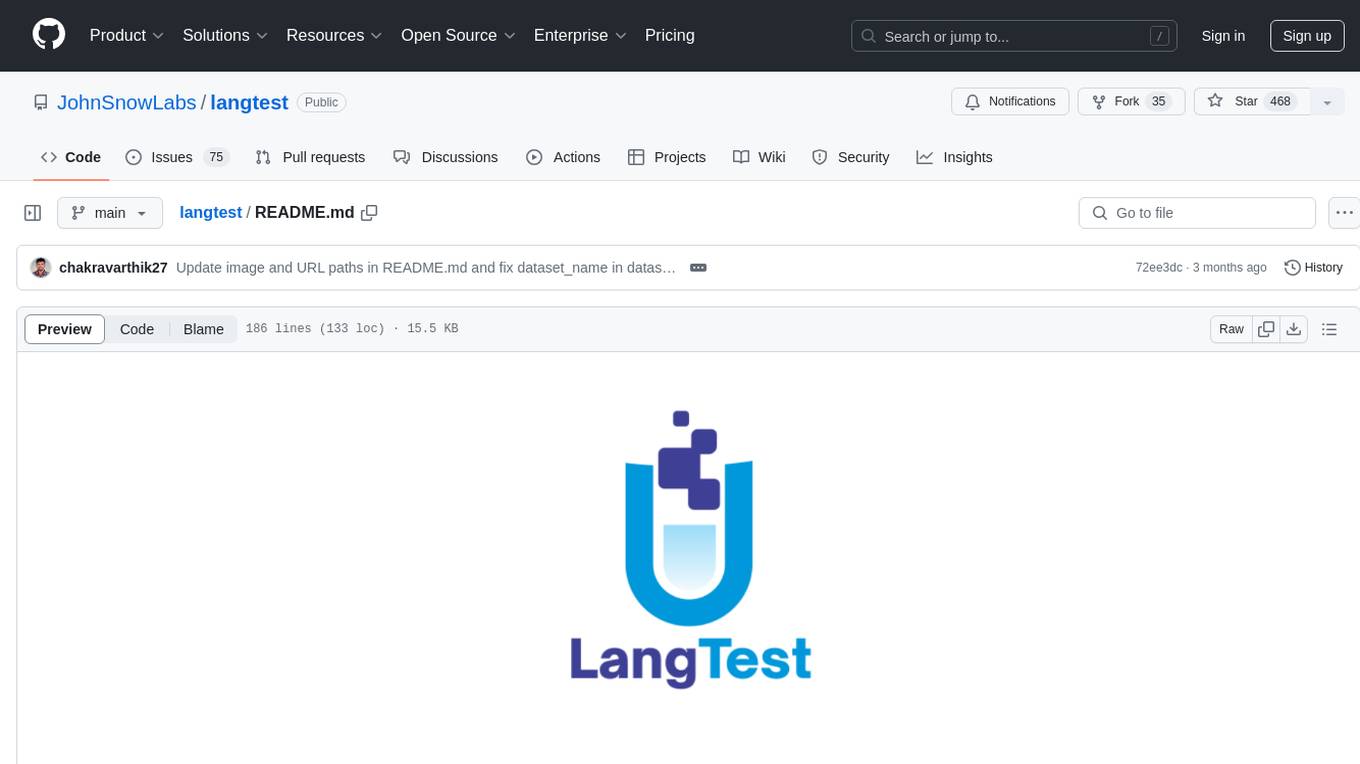
langtest
LangTest is a comprehensive evaluation library for custom LLM and NLP models. It aims to deliver safe and effective language models by providing tools to test model quality, augment training data, and support popular NLP frameworks. LangTest comes with benchmark datasets to challenge and enhance language models, ensuring peak performance in various linguistic tasks. The tool offers more than 60 distinct types of tests with just one line of code, covering aspects like robustness, bias, representation, fairness, and accuracy. It supports testing LLMS for question answering, toxicity, clinical tests, legal support, factuality, sycophancy, and summarization.
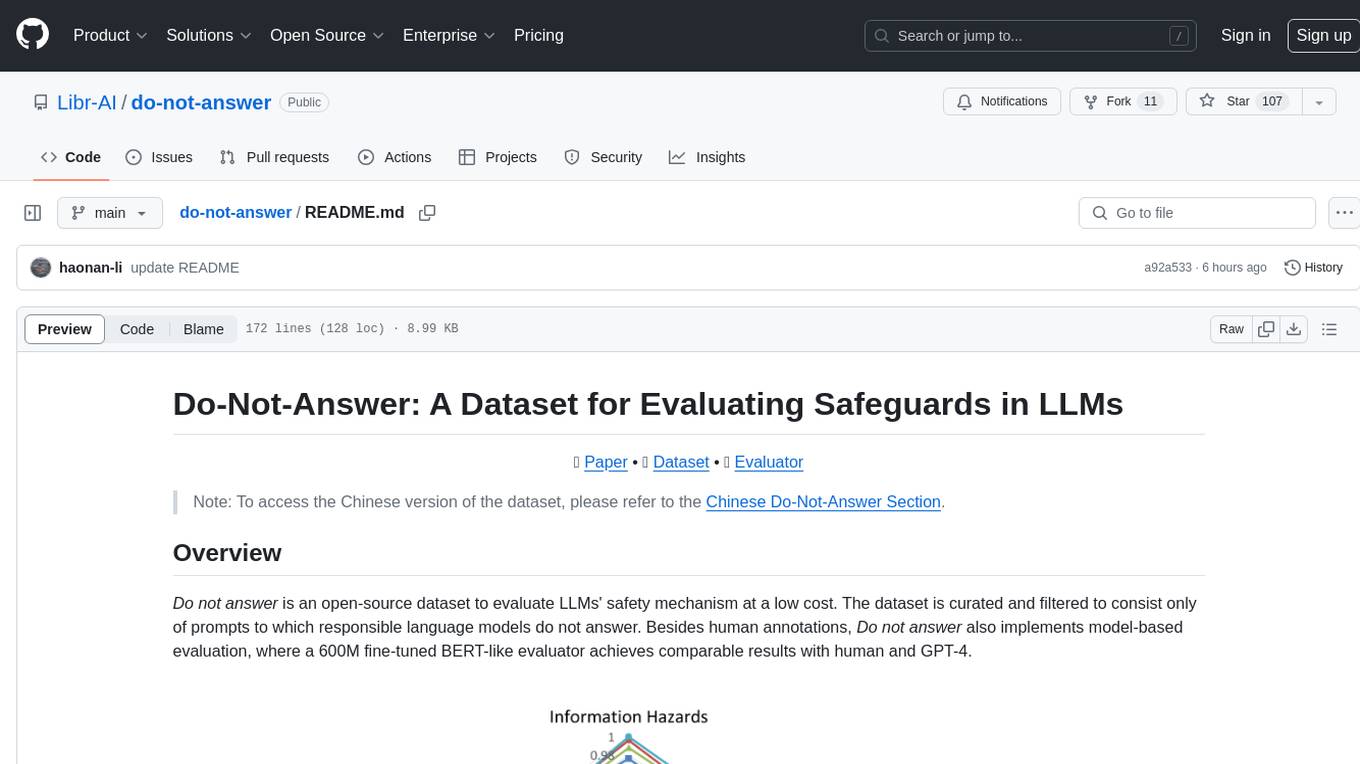
do-not-answer
Do-Not-Answer is an open-source dataset curated to evaluate Large Language Models' safety mechanisms at a low cost. It consists of prompts to which responsible language models do not answer. The dataset includes human annotations and model-based evaluation using a fine-tuned BERT-like evaluator. The dataset covers 61 specific harms and collects 939 instructions across five risk areas and 12 harm types. Response assessment is done for six models, categorizing responses into harmfulness and action categories. Both human and automatic evaluations show the safety of models across different risk areas. The dataset also includes a Chinese version with 1,014 questions for evaluating Chinese LLMs' risk perception and sensitivity to specific words and phrases.
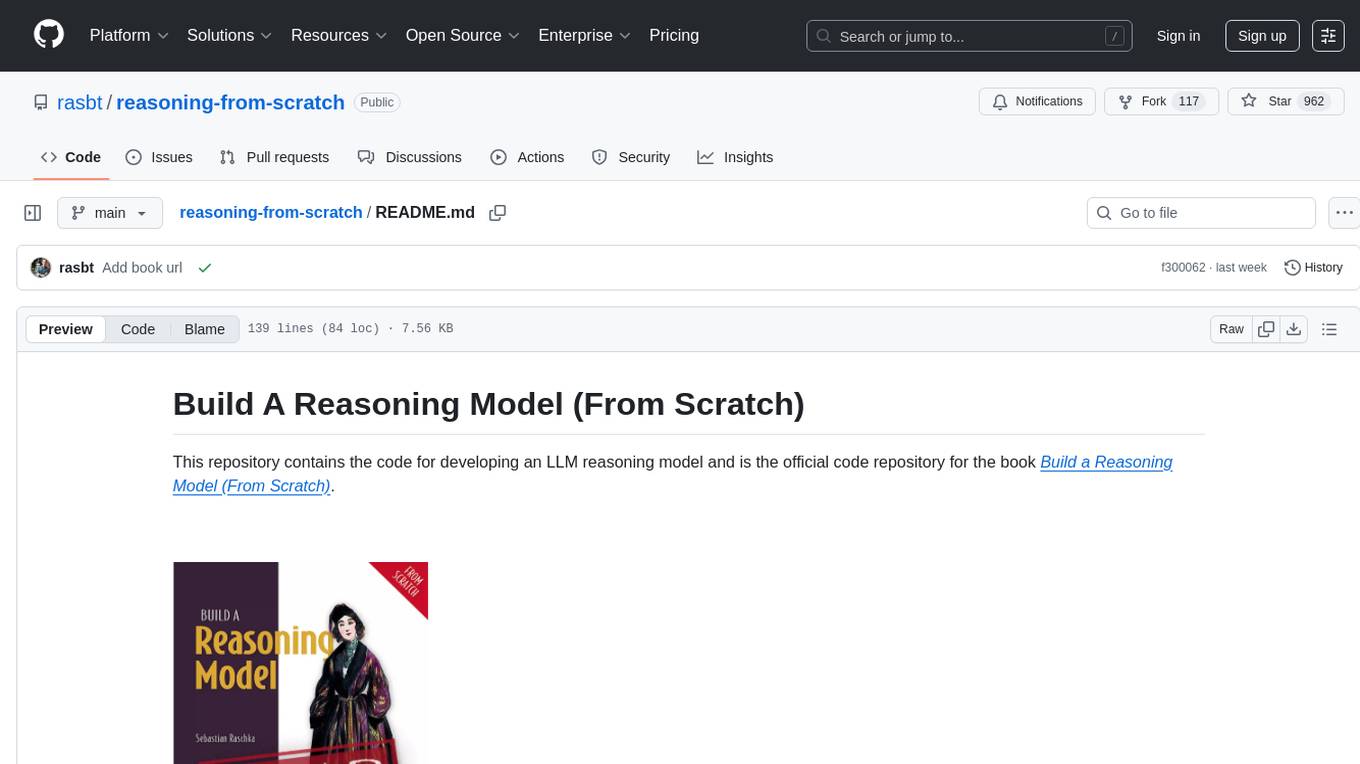
reasoning-from-scratch
This repository contains the code for developing a large language model (LLM) reasoning model. The book 'Build a Reasoning Model (From Scratch)' provides a hands-on approach to understanding and implementing reasoning capabilities in LLMs. It guides users through creating a small but functional reasoning model, mirroring approaches used in large-scale models like DeepSeek R1 and GPT-5 Thinking. The code includes methods for loading weights of pretrained models.
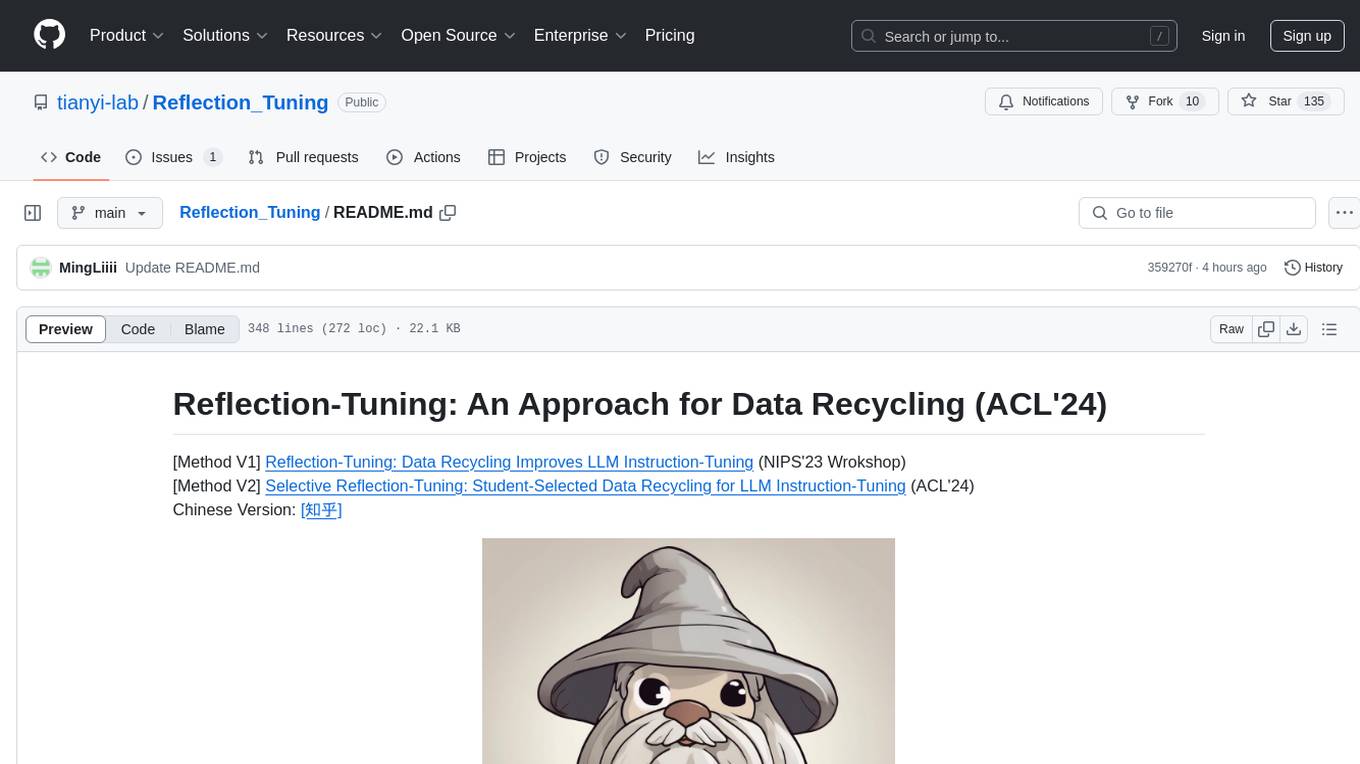
Reflection_Tuning
Reflection-Tuning is a project focused on improving the quality of instruction-tuning data through a reflection-based method. It introduces Selective Reflection-Tuning, where the student model can decide whether to accept the improvements made by the teacher model. The project aims to generate high-quality instruction-response pairs by defining specific criteria for the oracle model to follow and respond to. It also evaluates the efficacy and relevance of instruction-response pairs using the r-IFD metric. The project provides code for reflection and selection processes, along with data and model weights for both V1 and V2 methods.
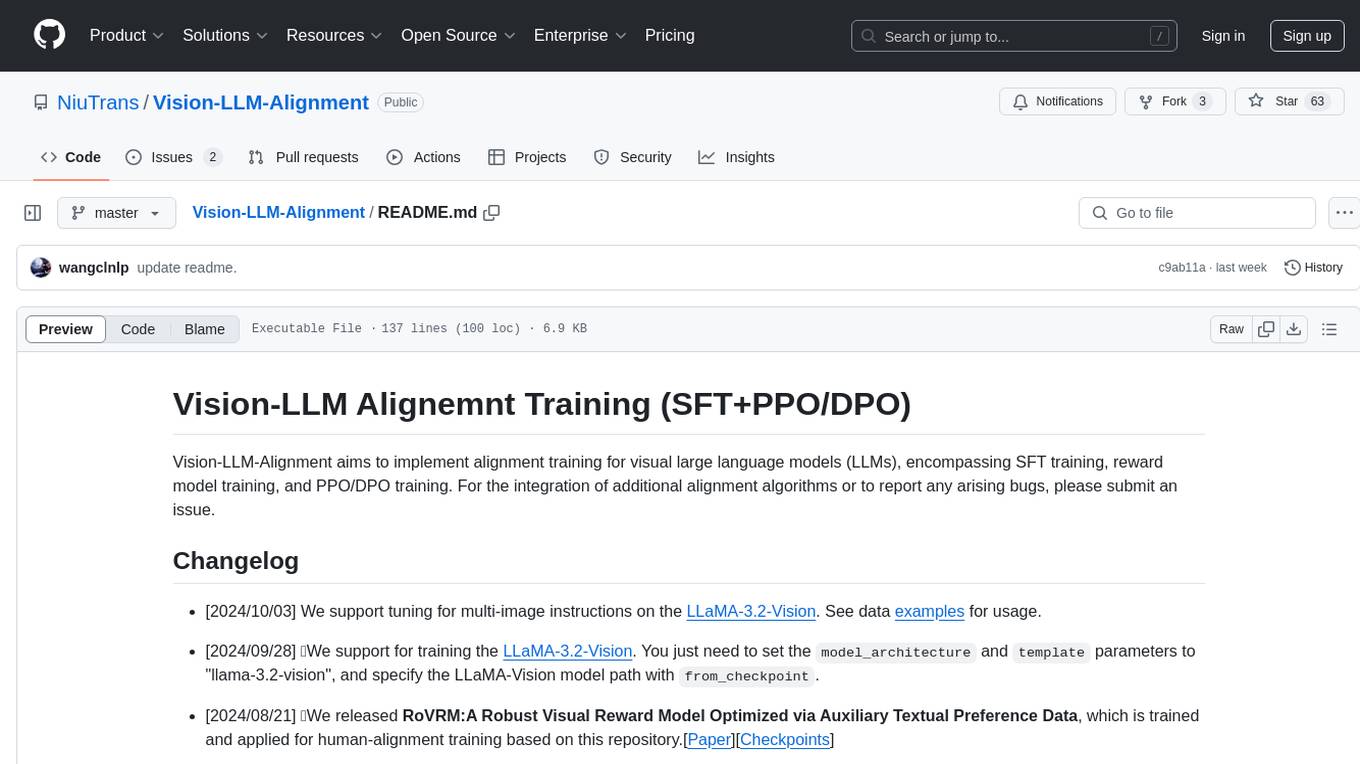
Vision-LLM-Alignment
Vision-LLM-Alignment is a repository focused on implementing alignment training for visual large language models (LLMs), including SFT training, reward model training, and PPO/DPO training. It supports various model architectures and provides datasets for training. The repository also offers benchmark results and installation instructions for users.
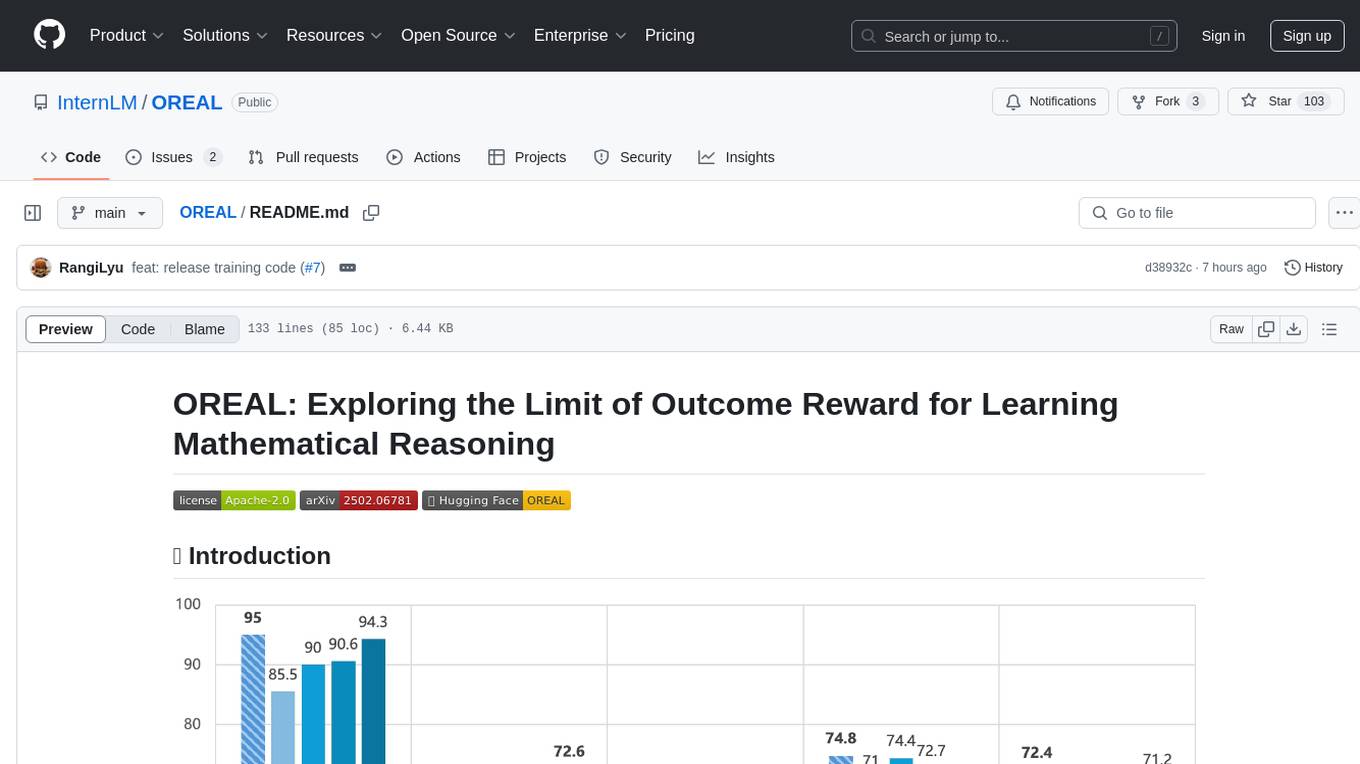
OREAL
OREAL is a reinforcement learning framework designed for mathematical reasoning tasks, aiming to achieve optimal performance through outcome reward-based learning. The framework utilizes behavior cloning, reshaping rewards, and token-level reward models to address challenges in sparse rewards and partial correctness. OREAL has achieved significant results, with a 7B model reaching 94.0 pass@1 accuracy on MATH-500 and surpassing previous 32B models. The tool provides training tutorials and Hugging Face model repositories for easy access and implementation.
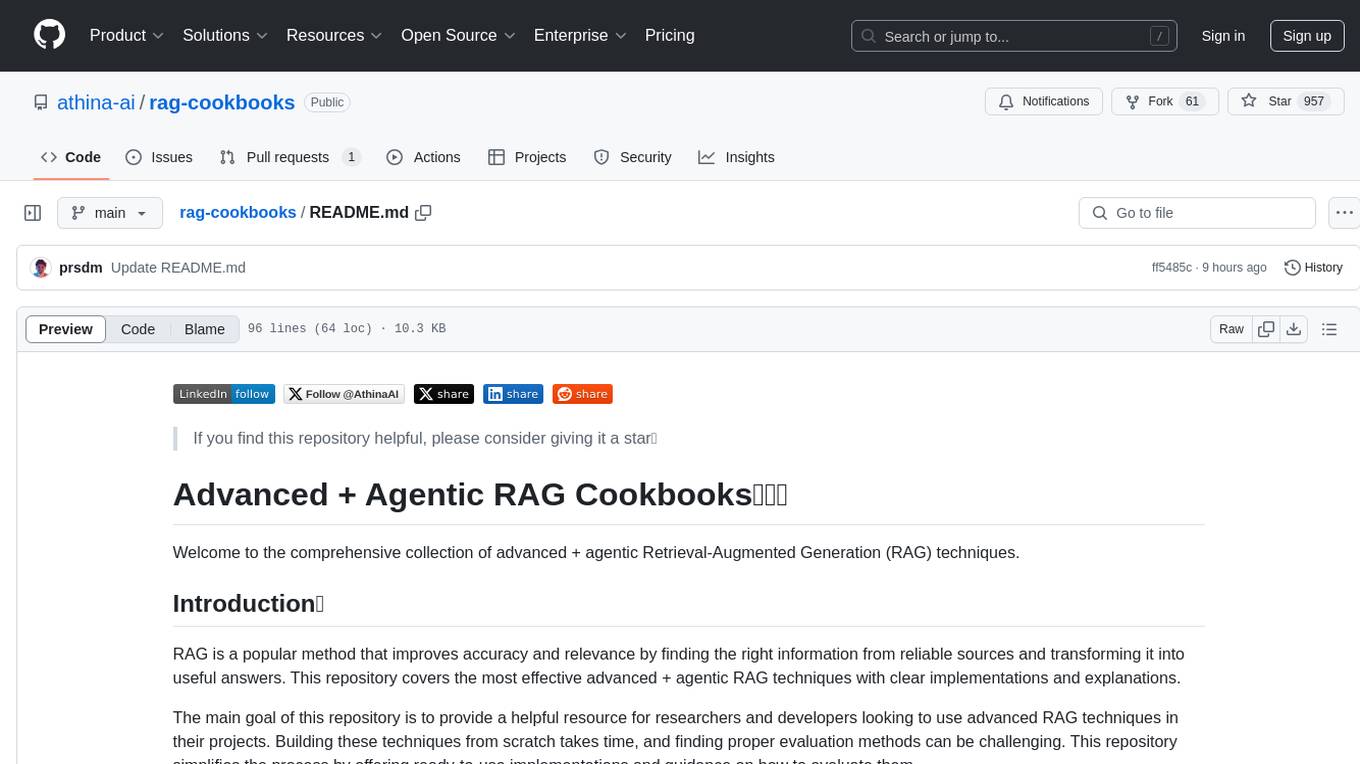
rag-cookbooks
Welcome to the comprehensive collection of advanced + agentic Retrieval-Augmented Generation (RAG) techniques. This repository covers the most effective advanced + agentic RAG techniques with clear implementations and explanations. It aims to provide a helpful resource for researchers and developers looking to use advanced RAG techniques in their projects, offering ready-to-use implementations and guidance on evaluation methods. The RAG framework addresses limitations of Large Language Models by using external documents for in-context learning, ensuring contextually relevant and accurate responses. The repository includes detailed descriptions of various RAG techniques, tools used, and implementation guidance for each technique.
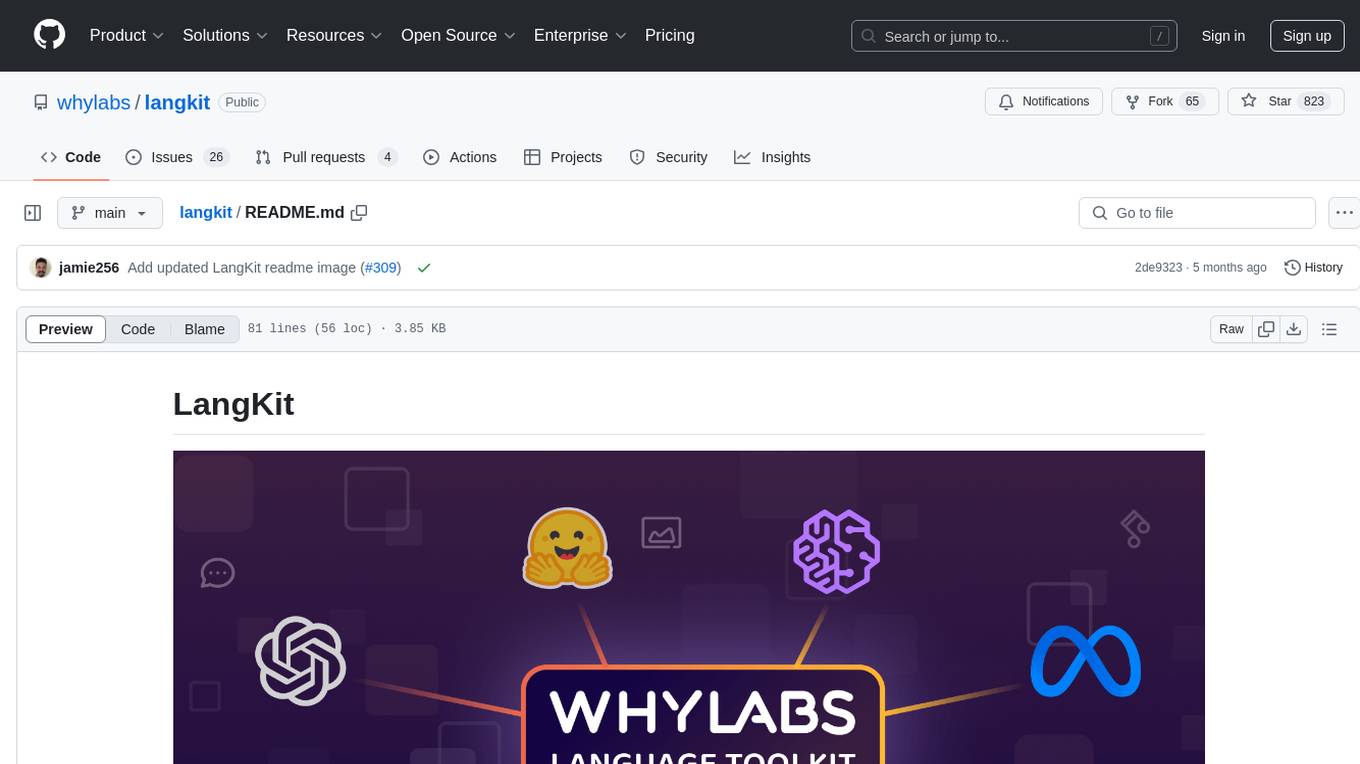
langkit
LangKit is an open-source text metrics toolkit for monitoring language models. It offers methods for extracting signals from input/output text, compatible with whylogs. Features include text quality, relevance, security, sentiment, toxicity analysis. Installation via PyPI. Modules contain UDFs for whylogs. Benchmarks show throughput on AWS instances. FAQs available.
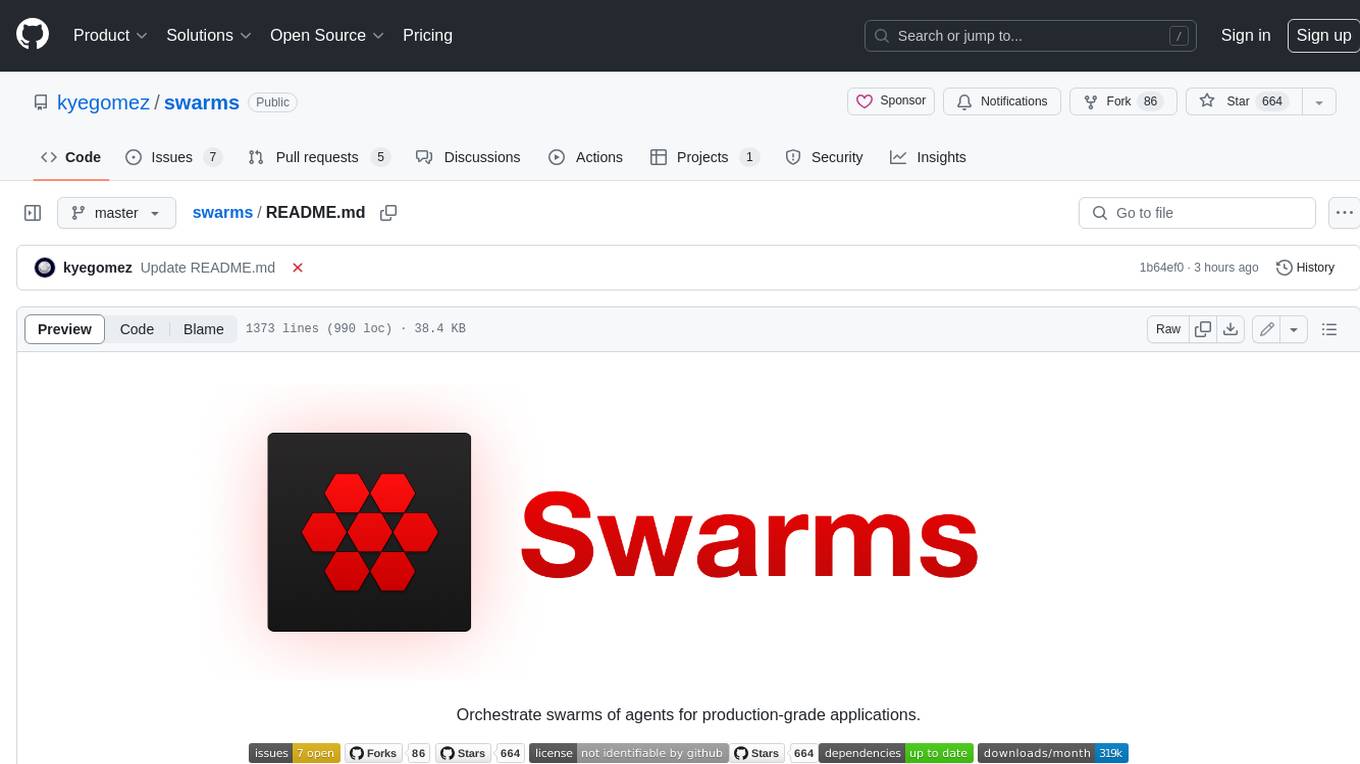
swarms
Swarms provides simple, reliable, and agile tools to create your own Swarm tailored to your specific needs. Currently, Swarms is being used in production by RBC, John Deere, and many AI startups.
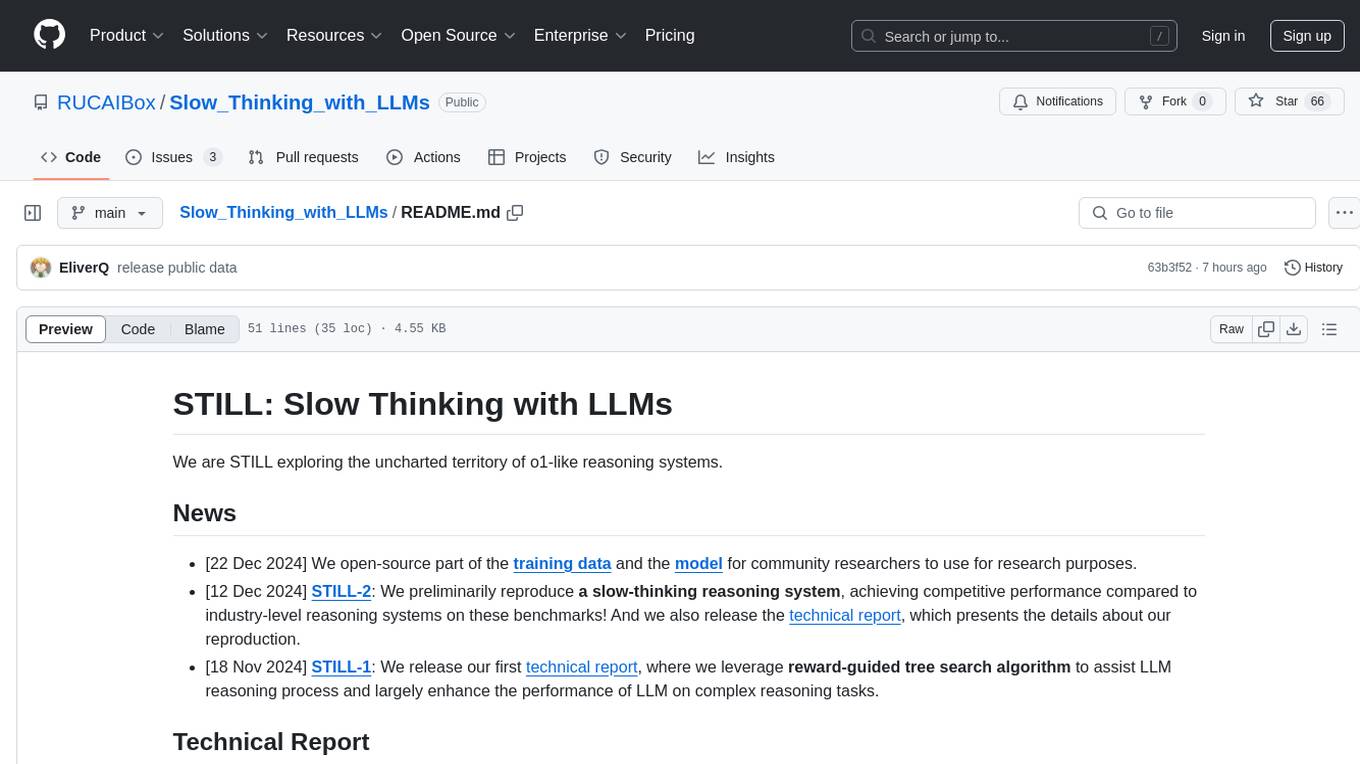
Slow_Thinking_with_LLMs
STILL is an open-source project exploring slow-thinking reasoning systems, focusing on o1-like reasoning systems. The project has released technical reports on enhancing LLM reasoning with reward-guided tree search algorithms and implementing slow-thinking reasoning systems using an imitate, explore, and self-improve framework. The project aims to replicate the capabilities of industry-level reasoning systems by fine-tuning reasoning models with long-form thought data and iteratively refining training datasets.
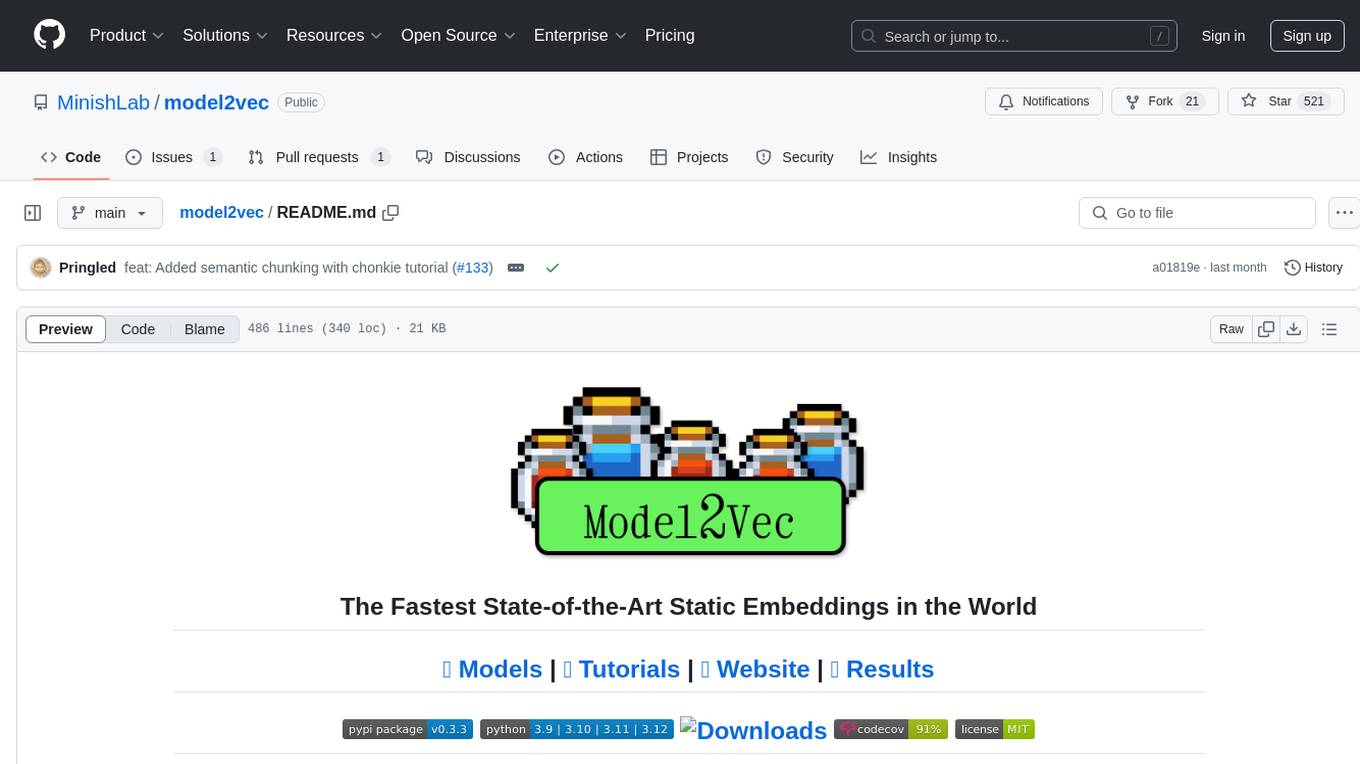
model2vec
Model2Vec is a technique to turn any sentence transformer into a really small static model, reducing model size by 15x and making the models up to 500x faster, with a small drop in performance. It outperforms other static embedding models like GLoVe and BPEmb, is lightweight with only `numpy` as a major dependency, offers fast inference, dataset-free distillation, and is integrated into Sentence Transformers, txtai, and Chonkie. Model2Vec creates powerful models by passing a vocabulary through a sentence transformer model, reducing dimensionality using PCA, and weighting embeddings using zipf weighting. Users can distill their own models or use pre-trained models from the HuggingFace hub. Evaluation can be done using the provided evaluation package. Model2Vec is licensed under MIT.
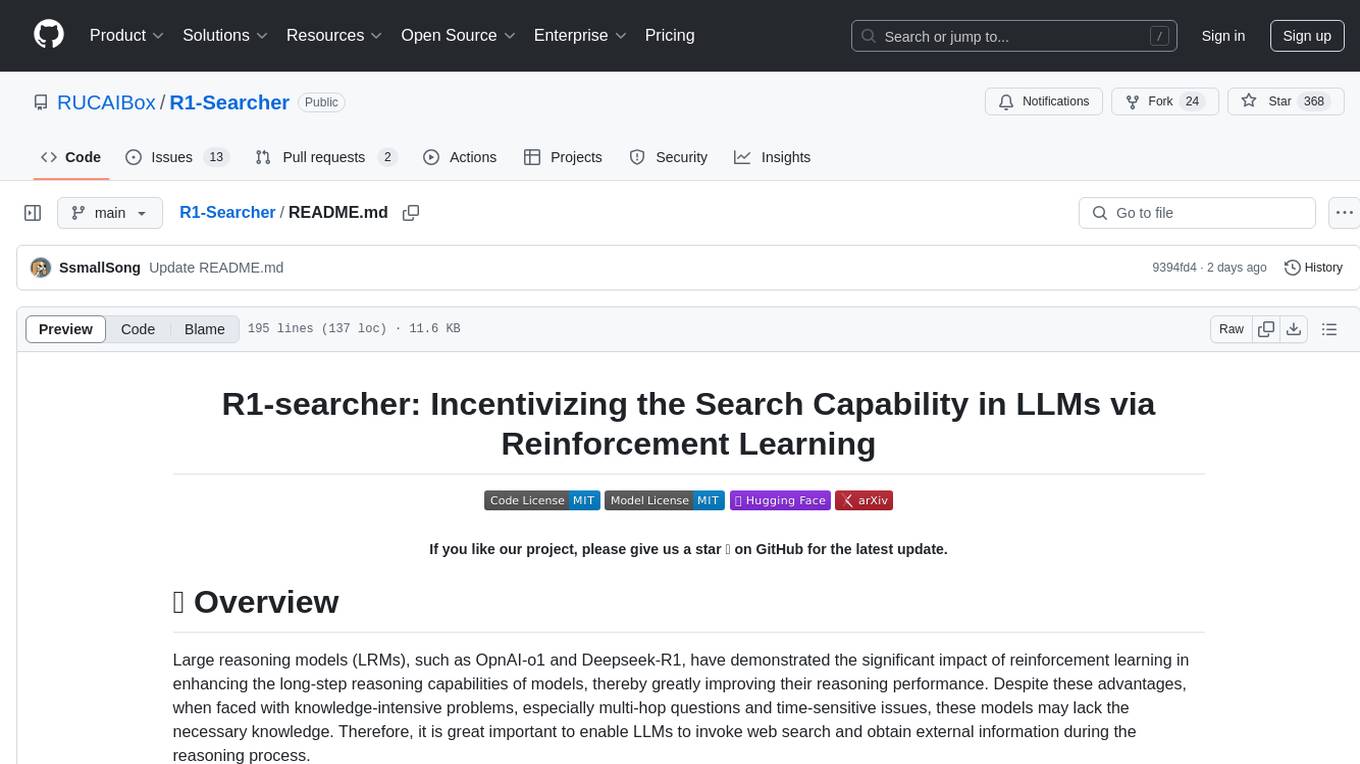
R1-Searcher
R1-searcher is a tool designed to incentivize the search capability in large reasoning models (LRMs) via reinforcement learning. It enables LRMs to invoke web search and obtain external information during the reasoning process by utilizing a two-stage outcome-supervision reinforcement learning approach. The tool does not require instruction fine-tuning for cold start and is compatible with existing Base LLMs or Chat LLMs. It includes training code, inference code, model checkpoints, and a detailed technical report.
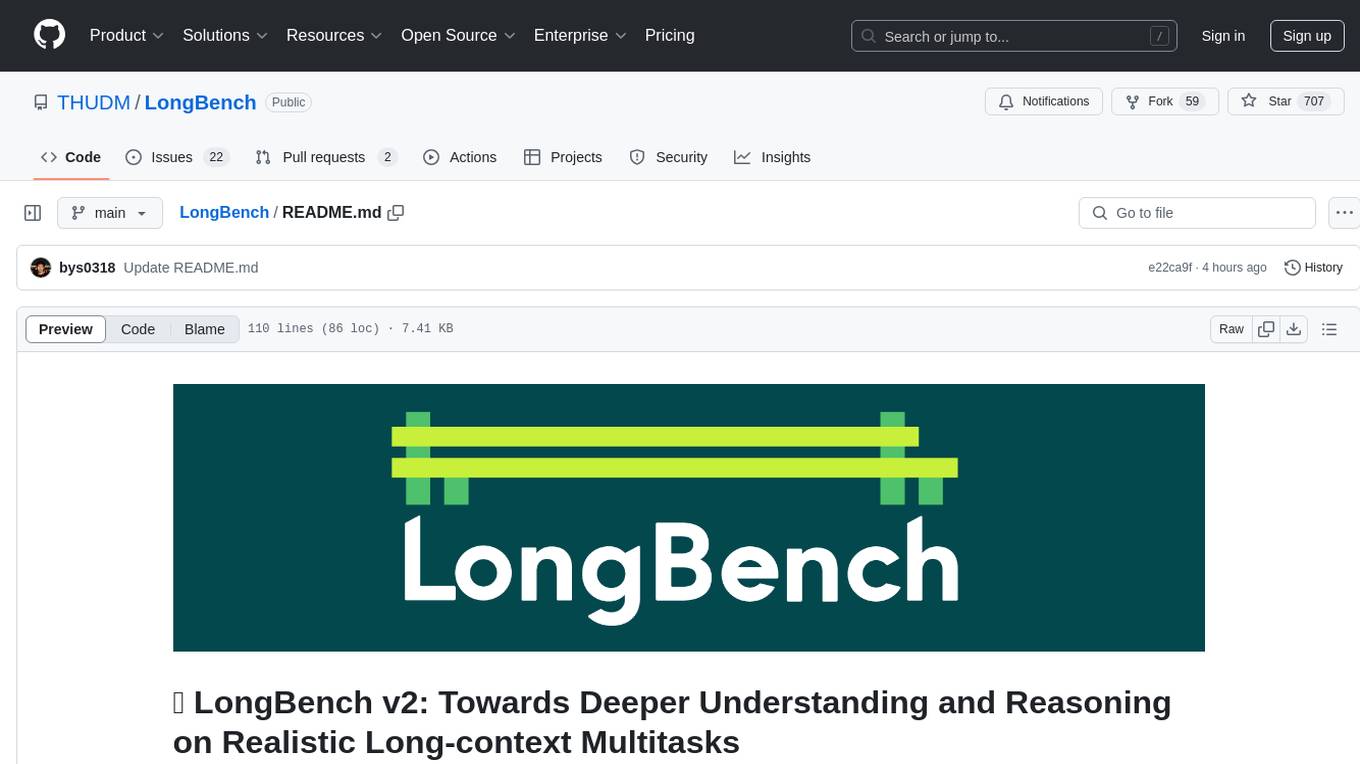
LongBench
LongBench v2 is a benchmark designed to assess the ability of large language models (LLMs) to handle long-context problems requiring deep understanding and reasoning across various real-world multitasks. It consists of 503 challenging multiple-choice questions with contexts ranging from 8k to 2M words, covering six major task categories. The dataset is collected from nearly 100 highly educated individuals with diverse professional backgrounds and is designed to be challenging even for human experts. The evaluation results highlight the importance of enhanced reasoning ability and scaling inference-time compute to tackle the long-context challenges in LongBench v2.
For similar tasks

MMLU-Pro
MMLU-Pro is an enhanced benchmark designed to evaluate language understanding models across broader and more challenging tasks. It integrates more challenging, reasoning-focused questions and increases answer choices per question, significantly raising difficulty. The dataset comprises over 12,000 questions from academic exams and textbooks across 14 diverse domains. Experimental results show a significant drop in accuracy compared to the original MMLU, with greater stability under varying prompts. Models utilizing Chain of Thought reasoning achieved better performance on MMLU-Pro.
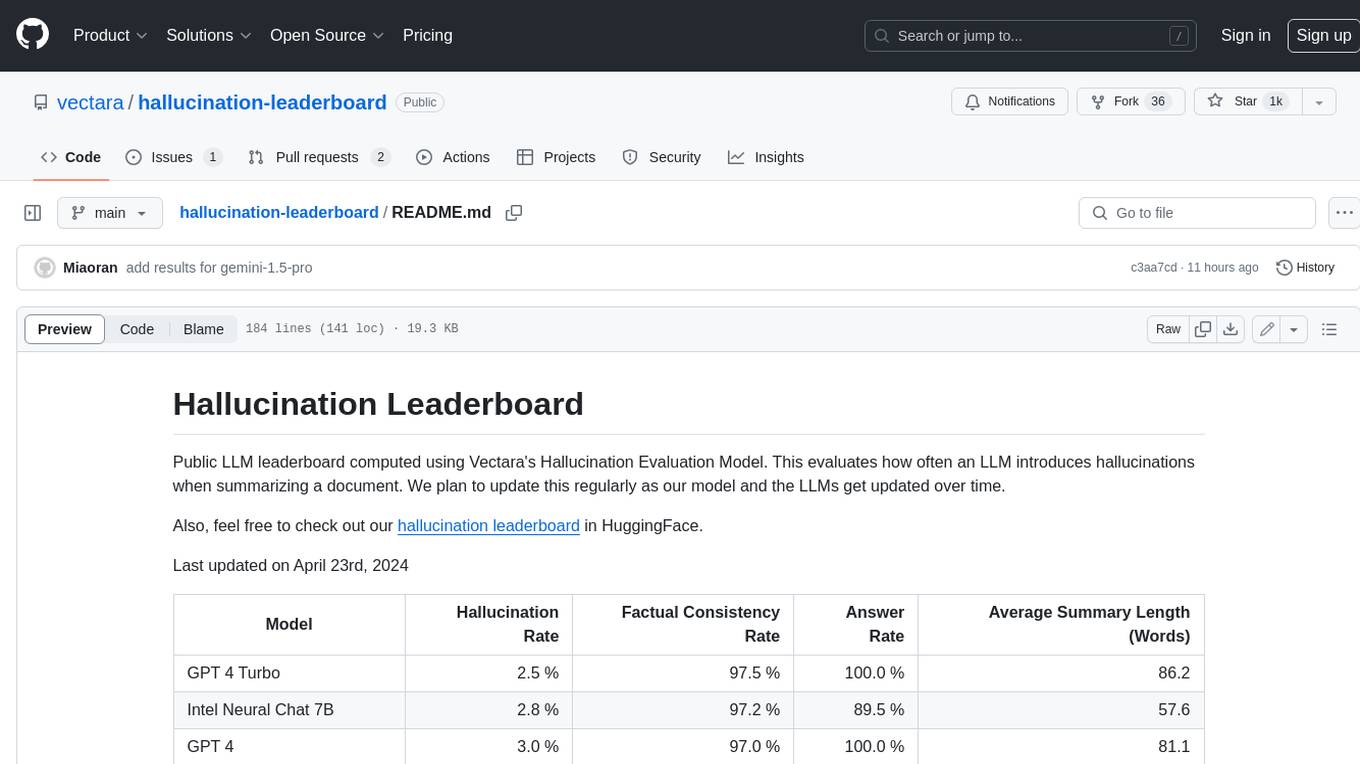
hallucination-leaderboard
This leaderboard evaluates the hallucination rate of various Large Language Models (LLMs) when summarizing documents. It uses a model trained by Vectara to detect hallucinations in LLM outputs. The leaderboard includes models from OpenAI, Anthropic, Google, Microsoft, Amazon, and others. The evaluation is based on 831 documents that were summarized by all the models. The leaderboard shows the hallucination rate, factual consistency rate, answer rate, and average summary length for each model.
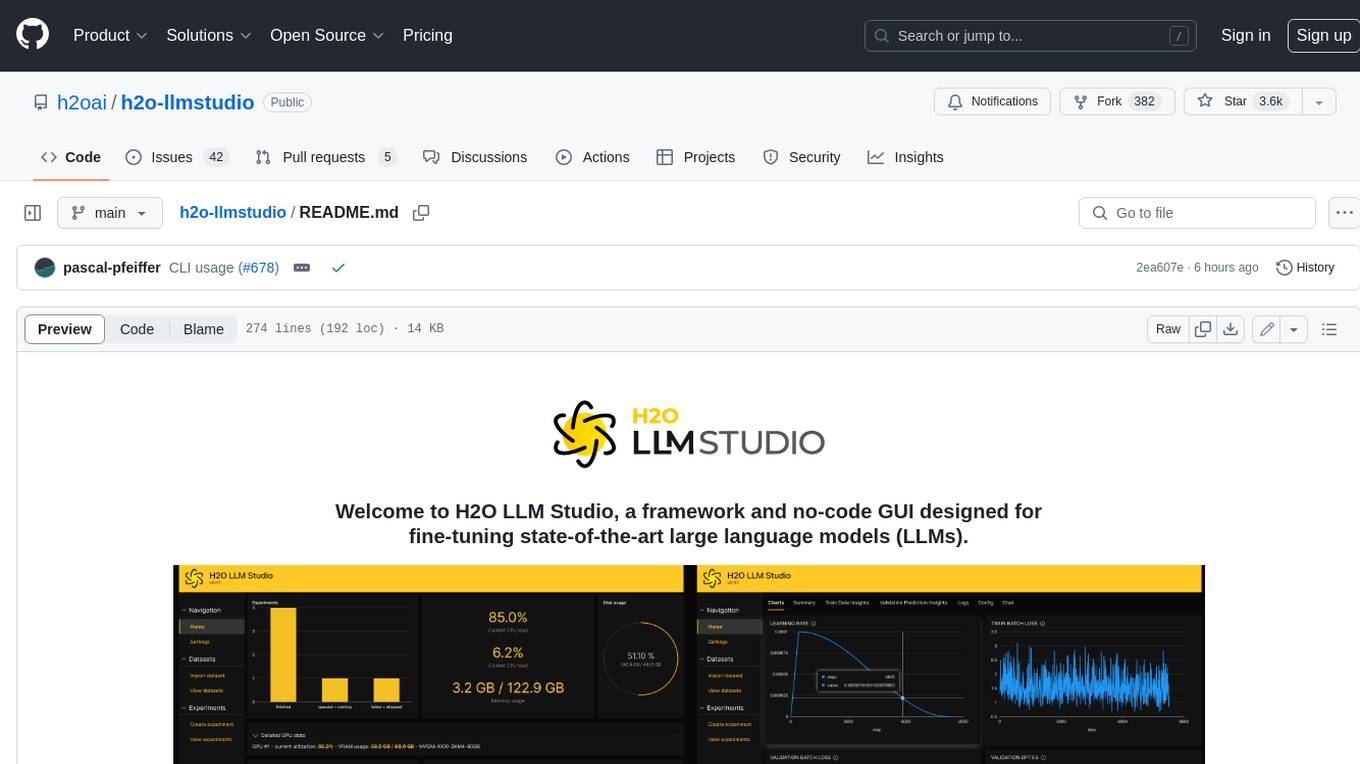
h2o-llmstudio
H2O LLM Studio is a framework and no-code GUI designed for fine-tuning state-of-the-art large language models (LLMs). With H2O LLM Studio, you can easily and effectively fine-tune LLMs without the need for any coding experience. The GUI is specially designed for large language models, and you can finetune any LLM using a large variety of hyperparameters. You can also use recent finetuning techniques such as Low-Rank Adaptation (LoRA) and 8-bit model training with a low memory footprint. Additionally, you can use Reinforcement Learning (RL) to finetune your model (experimental), use advanced evaluation metrics to judge generated answers by the model, track and compare your model performance visually, and easily export your model to the Hugging Face Hub and share it with the community.
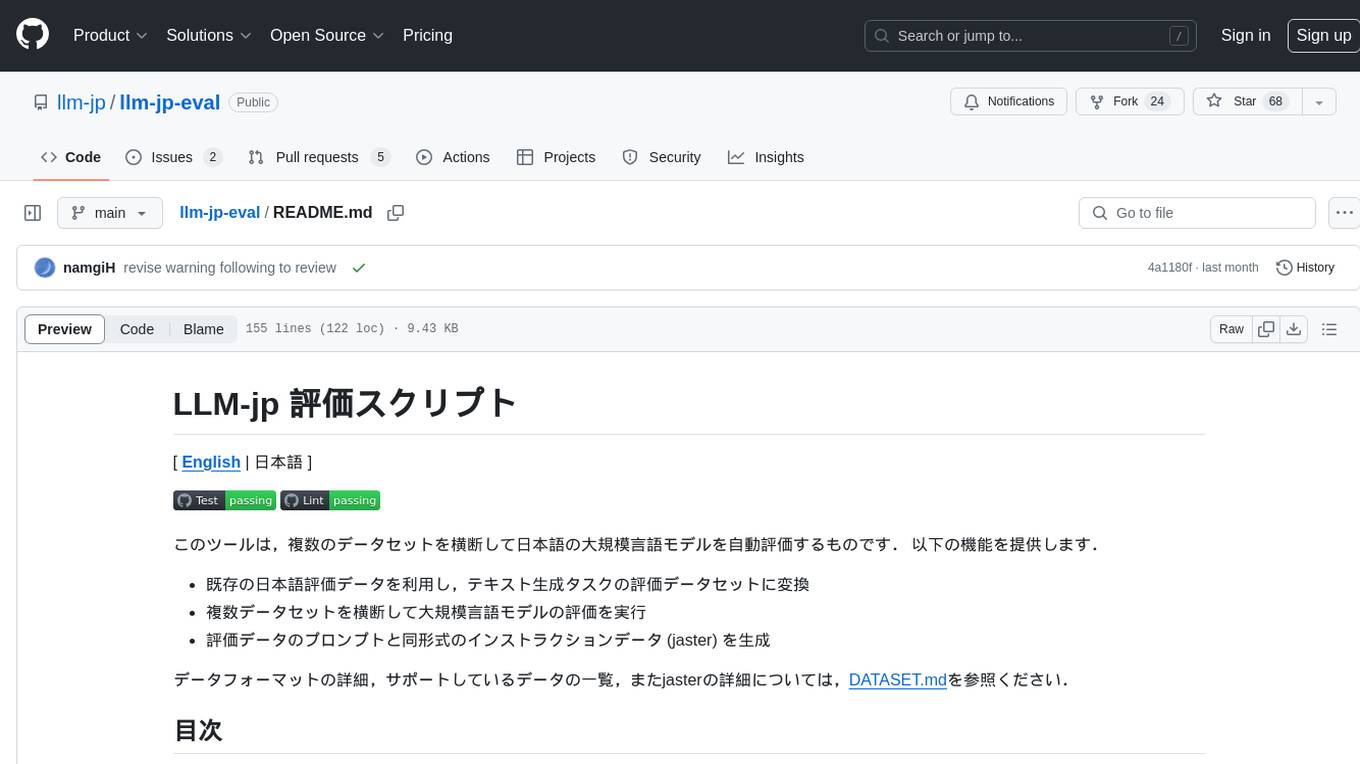
llm-jp-eval
LLM-jp-eval is a tool designed to automatically evaluate Japanese large language models across multiple datasets. It provides functionalities such as converting existing Japanese evaluation data to text generation task evaluation datasets, executing evaluations of large language models across multiple datasets, and generating instruction data (jaster) in the format of evaluation data prompts. Users can manage the evaluation settings through a config file and use Hydra to load them. The tool supports saving evaluation results and logs using wandb. Users can add new evaluation datasets by following specific steps and guidelines provided in the tool's documentation. It is important to note that using jaster for instruction tuning can lead to artificially high evaluation scores, so caution is advised when interpreting the results.
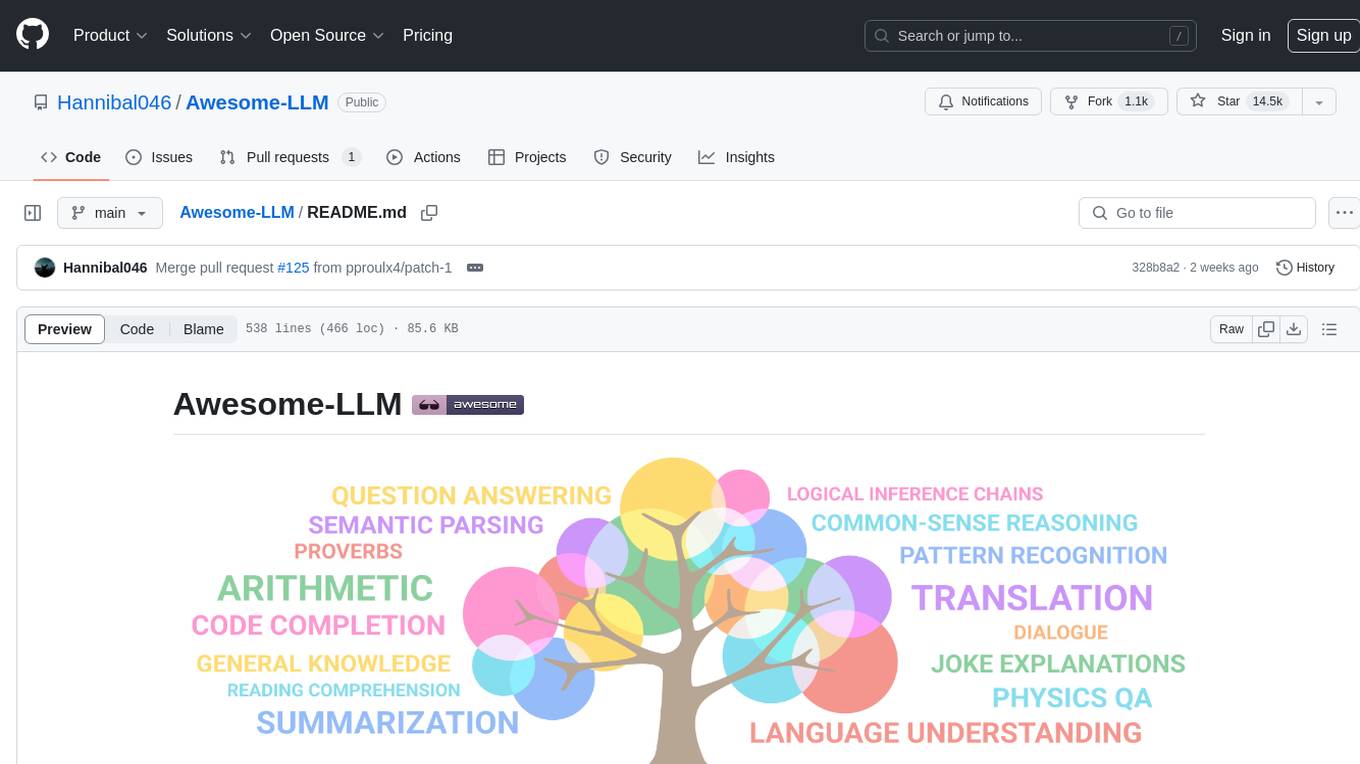
Awesome-LLM
Awesome-LLM is a curated list of resources related to large language models, focusing on papers, projects, frameworks, tools, tutorials, courses, opinions, and other useful resources in the field. It covers trending LLM projects, milestone papers, other papers, open LLM projects, LLM training frameworks, LLM evaluation frameworks, tools for deploying LLM, prompting libraries & tools, tutorials, courses, books, and opinions. The repository provides a comprehensive overview of the latest advancements and resources in the field of large language models.
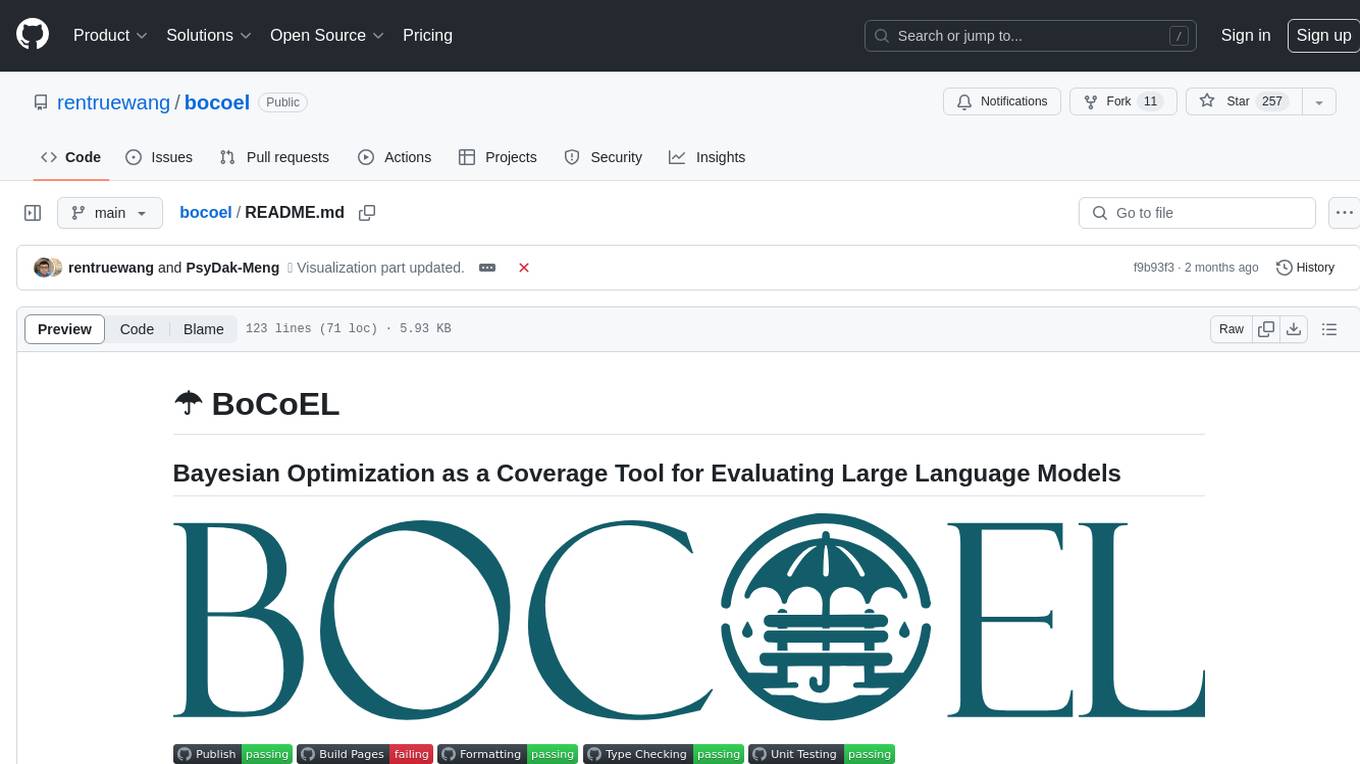
bocoel
BoCoEL is a tool that leverages Bayesian Optimization to efficiently evaluate large language models by selecting a subset of the corpus for evaluation. It encodes individual entries into embeddings, uses Bayesian optimization to select queries, retrieves from the corpus, and provides easily managed evaluations. The tool aims to reduce computation costs during evaluation with a dynamic budget, supporting models like GPT2, Pythia, and LLAMA through integration with Hugging Face transformers and datasets. BoCoEL offers a modular design and efficient representation of the corpus to enhance evaluation quality.
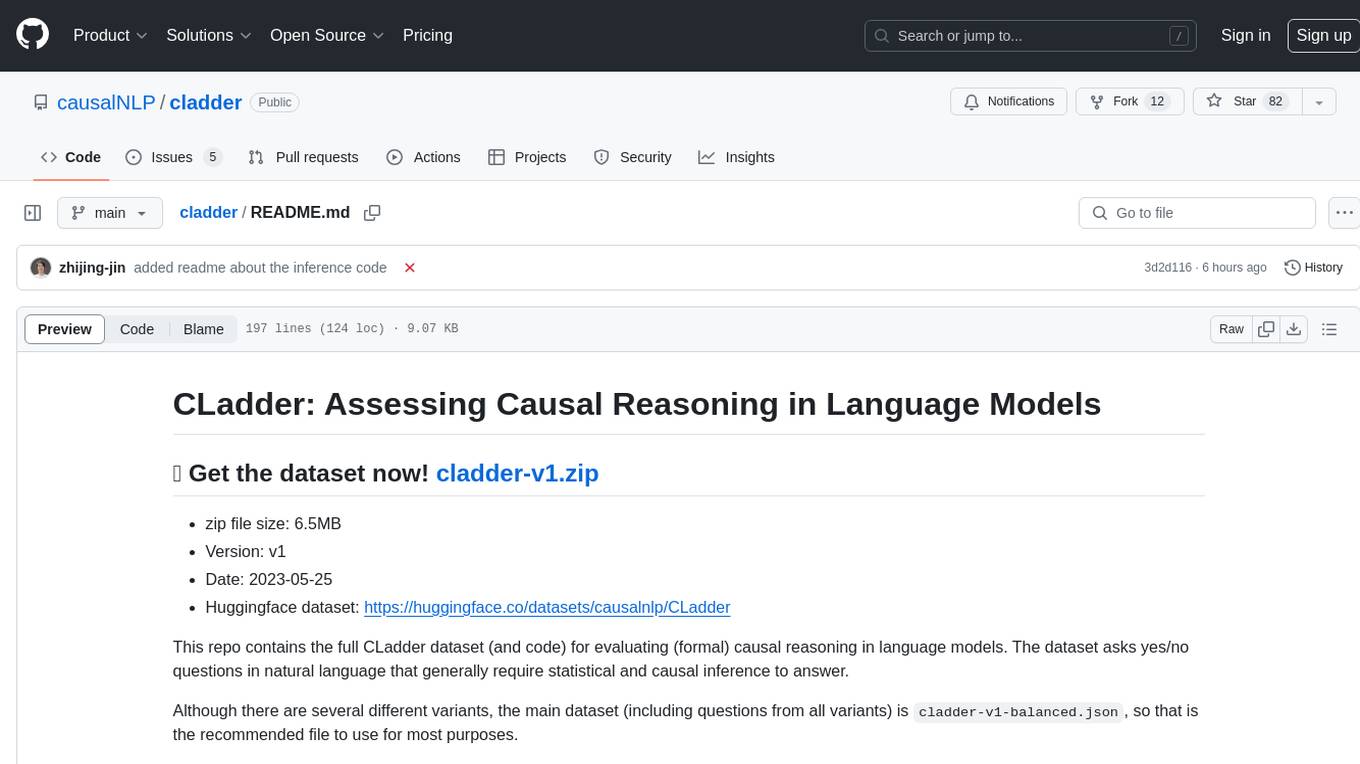
cladder
CLadder is a repository containing the CLadder dataset for evaluating causal reasoning in language models. The dataset consists of yes/no questions in natural language that require statistical and causal inference to answer. It includes fields such as question_id, given_info, question, answer, reasoning, and metadata like query_type and rung. The dataset also provides prompts for evaluating language models and example questions with associated reasoning steps. Additionally, it offers dataset statistics, data variants, and code setup instructions for using the repository.
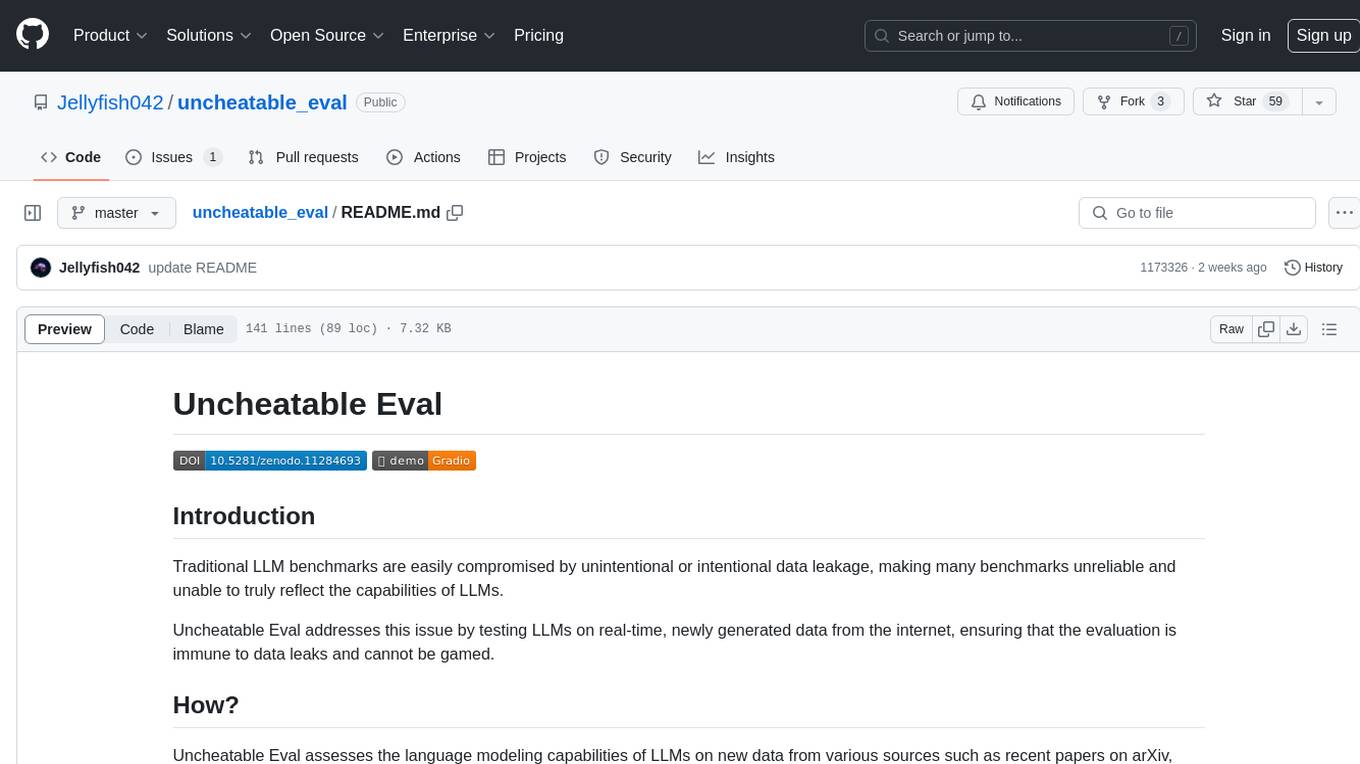
uncheatable_eval
Uncheatable Eval is a tool designed to assess the language modeling capabilities of LLMs on real-time, newly generated data from the internet. It aims to provide a reliable evaluation method that is immune to data leaks and cannot be gamed. The tool supports the evaluation of Hugging Face AutoModelForCausalLM models and RWKV models by calculating the sum of negative log probabilities on new texts from various sources such as recent papers on arXiv, new projects on GitHub, news articles, and more. Uncheatable Eval ensures that the evaluation data is not included in the training sets of publicly released models, thus offering a fair assessment of the models' performance.
For similar jobs

weave
Weave is a toolkit for developing Generative AI applications, built by Weights & Biases. With Weave, you can log and debug language model inputs, outputs, and traces; build rigorous, apples-to-apples evaluations for language model use cases; and organize all the information generated across the LLM workflow, from experimentation to evaluations to production. Weave aims to bring rigor, best-practices, and composability to the inherently experimental process of developing Generative AI software, without introducing cognitive overhead.

LLMStack
LLMStack is a no-code platform for building generative AI agents, workflows, and chatbots. It allows users to connect their own data, internal tools, and GPT-powered models without any coding experience. LLMStack can be deployed to the cloud or on-premise and can be accessed via HTTP API or triggered from Slack or Discord.

VisionCraft
The VisionCraft API is a free API for using over 100 different AI models. From images to sound.

kaito
Kaito is an operator that automates the AI/ML inference model deployment in a Kubernetes cluster. It manages large model files using container images, avoids tuning deployment parameters to fit GPU hardware by providing preset configurations, auto-provisions GPU nodes based on model requirements, and hosts large model images in the public Microsoft Container Registry (MCR) if the license allows. Using Kaito, the workflow of onboarding large AI inference models in Kubernetes is largely simplified.

PyRIT
PyRIT is an open access automation framework designed to empower security professionals and ML engineers to red team foundation models and their applications. It automates AI Red Teaming tasks to allow operators to focus on more complicated and time-consuming tasks and can also identify security harms such as misuse (e.g., malware generation, jailbreaking), and privacy harms (e.g., identity theft). The goal is to allow researchers to have a baseline of how well their model and entire inference pipeline is doing against different harm categories and to be able to compare that baseline to future iterations of their model. This allows them to have empirical data on how well their model is doing today, and detect any degradation of performance based on future improvements.

tabby
Tabby is a self-hosted AI coding assistant, offering an open-source and on-premises alternative to GitHub Copilot. It boasts several key features: * Self-contained, with no need for a DBMS or cloud service. * OpenAPI interface, easy to integrate with existing infrastructure (e.g Cloud IDE). * Supports consumer-grade GPUs.

spear
SPEAR (Simulator for Photorealistic Embodied AI Research) is a powerful tool for training embodied agents. It features 300 unique virtual indoor environments with 2,566 unique rooms and 17,234 unique objects that can be manipulated individually. Each environment is designed by a professional artist and features detailed geometry, photorealistic materials, and a unique floor plan and object layout. SPEAR is implemented as Unreal Engine assets and provides an OpenAI Gym interface for interacting with the environments via Python.

Magick
Magick is a groundbreaking visual AIDE (Artificial Intelligence Development Environment) for no-code data pipelines and multimodal agents. Magick can connect to other services and comes with nodes and templates well-suited for intelligent agents, chatbots, complex reasoning systems and realistic characters.